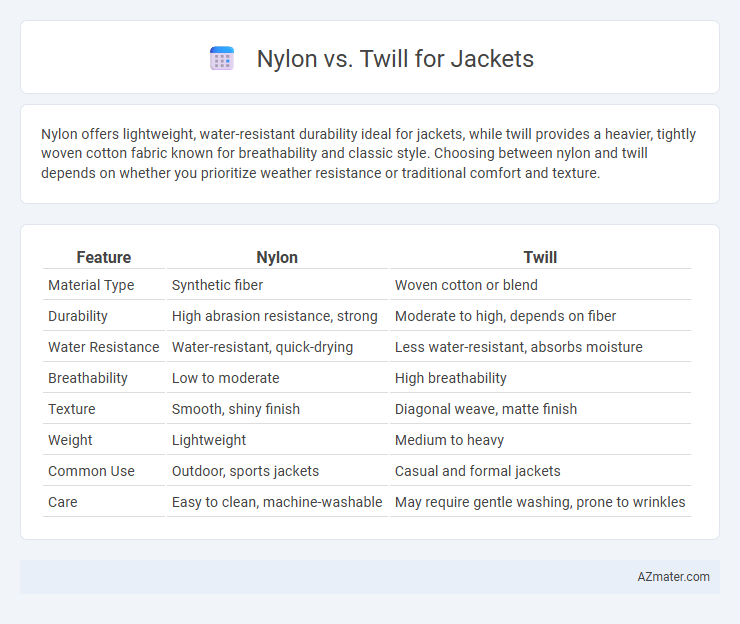Nylon offers lightweight, water-resistant durability ideal for jackets, while twill provides a heavier, tightly woven cotton fabric known for breathability and classic style. Choosing between nylon and twill depends on whether you prioritize weather resistance or traditional comfort and texture.
Table of Comparison
| Feature | Nylon | Twill |
|---|---|---|
| Material Type | Synthetic fiber | Woven cotton or blend |
| Durability | High abrasion resistance, strong | Moderate to high, depends on fiber |
| Water Resistance | Water-resistant, quick-drying | Less water-resistant, absorbs moisture |
| Breathability | Low to moderate | High breathability |
| Texture | Smooth, shiny finish | Diagonal weave, matte finish |
| Weight | Lightweight | Medium to heavy |
| Common Use | Outdoor, sports jackets | Casual and formal jackets |
| Care | Easy to clean, machine-washable | May require gentle washing, prone to wrinkles |
Introduction to Nylon and Twill Fabrics
Nylon is a synthetic fabric known for its exceptional durability, water resistance, and lightweight properties, making it ideal for outerwear like jackets. Twill fabric, characterized by its distinctive diagonal weave, offers enhanced strength, breathability, and a smooth texture, commonly used for more structured and stylish jackets. Both materials provide unique benefits, with nylon excelling in performance and twill favored for its classic appearance and comfort.
Key Differences Between Nylon and Twill
Nylon jackets are known for their lightweight, water-resistant properties and strong durability, making them ideal for outdoor and active wear. Twill, characterized by its distinctive diagonal weave, offers a softer texture and better breathability, providing enhanced comfort and a classic appearance. The key differences lie in nylon's synthetic composition that repels moisture and twill's cotton or wool fibers that prioritize warmth and style.
Durability Comparison: Nylon vs Twill
Nylon jackets offer exceptional durability due to their high resistance to abrasion, water, and tearing, making them ideal for rugged outdoor use. Twill fabric, typically made from cotton or wool, provides moderate durability with good resistance to wear but is more prone to fraying and staining compared to nylon. In environments requiring long-lasting performance and weather resistance, nylon outperforms twill, while twill excels in breathability and comfort.
Water Resistance and Weather Protection
Nylon jackets offer superior water resistance due to their tightly woven synthetic fibers and durable water repellent (DWR) coatings, making them ideal for wet conditions. Twill fabric, often made from cotton or blends, provides moderate weather protection but lacks the inherent water resistance found in nylon, causing it to absorb moisture more readily. For optimal performance in rain or snow, nylon's quick-drying, wind-resistant properties make it a better choice for jacket construction.
Comfort and Breathability Factors
Nylon jackets offer lightweight durability with moderate breathability, making them suitable for active wear but can sometimes trap heat during extended use. Twill fabric, often made from cotton or blends, provides superior comfort and enhanced breathability due to its looser weave, ideal for casual or mild weather wear. Choosing between nylon and twill depends on prioritizing moisture-wicking efficiency versus soft texture and airflow in jacket material.
Style and Aesthetic Appeal
Nylon jackets offer a sleek, modern look with a smooth texture that enhances urban and sporty styles, making them ideal for contemporary fashion trends. Twill, characterized by its diagonal weave and matte finish, provides a classic and rugged aesthetic often associated with workwear or vintage-inspired designs. Choosing between nylon and twill depends on whether the desired jacket style leans towards minimalist innovation or traditional, textured sophistication.
Maintenance and Care Requirements
Nylon jackets require minimal maintenance, as they are water-resistant, quick-drying, and easy to clean with mild detergent and cold water. Twill fabric jackets demand more care, including gentle washing or dry cleaning to preserve the fabric's texture and prevent shrinkage or fading. Proper storage and occasional ironing are essential to maintain twill's appearance, while nylon is more resistant to wrinkles and wear over time.
Versatility for Various Jacket Types
Nylon offers exceptional versatility for jackets, excelling in lightweight, waterproof, and wind-resistant outerwear suitable for active and urban environments. Twill, characterized by its diagonal weave, provides durability and a more structured, polished appearance favored in casual and workwear jackets. Both materials adapt to different jacket styles, with nylon preferred for performance-focused designs and twill chosen for its classic look and toughness.
Cost Comparison and Value for Money
Nylon jackets typically cost less than twill jackets due to the lower manufacturing expenses and widespread availability of synthetic fibers, making them more budget-friendly for consumers. Twill jackets, often made from cotton or wool blends, offer enhanced durability and a classic appearance, providing higher long-term value despite their higher upfront price. Evaluating cost versus longevity and style, twill jackets deliver better value for money for those prioritizing durability and fashion, while nylon suits buyers seeking affordable, lightweight outerwear.
Choosing the Best Fabric: Nylon or Twill for Your Jacket
Nylon offers superior water resistance, lightweight durability, and windproof qualities ideal for active or outdoor jackets. Twill provides a heavier, more breathable fabric with a textured weave, delivering classic style and enhanced comfort for casual or workwear jackets. Selecting between nylon and twill depends on your jacket's intended use, balancing performance needs with aesthetic preferences.

Infographic: Nylon vs Twill for Jacket
 azmater.com
azmater.com